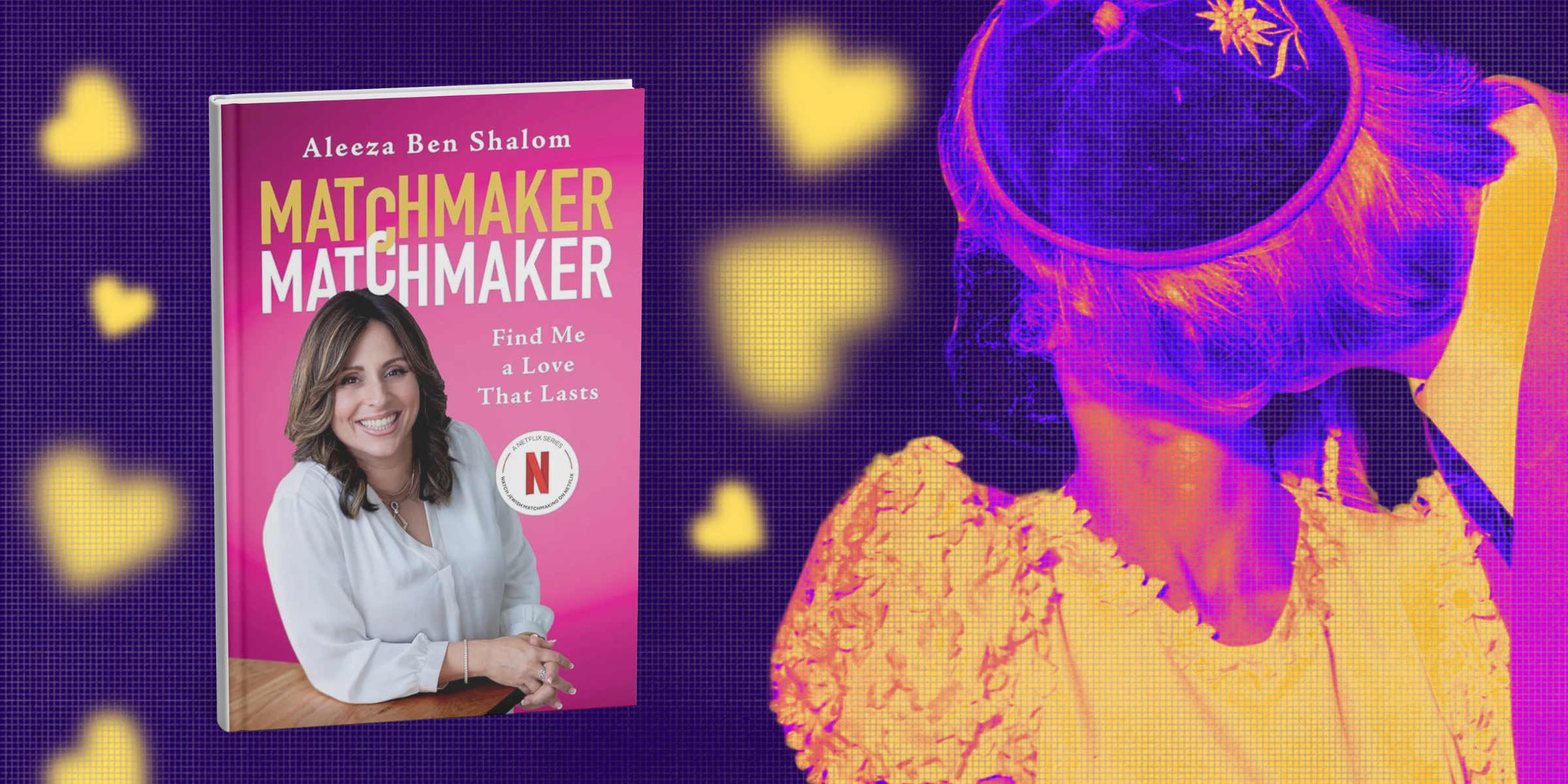Books
Essential Dating Tips From Jewish Matchmaker Aleeza Ben Shalom
When I was young, my mother used to say there were three criteria a man must meet to be considered marriage-worthy: He must have a rabbi in the family; he must have financial means; and his mother must be good looking, as this would ensure good looking children. It was not until I was much older that I realized these requirements somewhat paralleled the wish list in Fiddler on the Roof’s “Matchmaker”:
“For Papa, make him a scholar, for Mama, make him rich as a king, for me, well, I wouldn’t holler if he were as handsome as anything.…”
Aleeza Ben Shalom, author of the new Matchmaker, Matchmaker: Find Me a Love That Lasts (Union Square)—the title another ode to that famous Fiddler song—would likely tell you this is terrible advice. Ben Shalom, who lives in Israel, became a household name in the United States in 2023 when she starred in Netflix’s reality show Jewish Matchmaking. She is not the first matchmaker to carry a reality TV show—the show is a spinoff of Indian Matchmaking—nor even the first Jewish one. In 2008, Patti Stanger began an eight-year run on Bravo with The Millionaire Matchmaker. She might, however, be the first one who received nearly unanimous praise from both Jewish and non-Jewish viewers alike.
In California’s J. Weekly, Alix Wall wrote that “Jewish Matchmaking is…good for the Jews…. I would even posit that this matchmaker is one of the most positive representations—if not the most positive—I’ve seen of a Jewish woman on television. She gets extra points because she’s a real person, not a fictional character on a sitcom.”
Curt Schleier called her wisdom “heimishe” in a piece he wrote for this magazine and noted that Ben Shalom “couples that approach with a pragmatic, don’t-give-up mantra that she refers to in the Netflix show as ‘date ’em until you hate ’em.’ ”
Ben Shalom’s new book is an in-depth yet easily accessible look into her methodology. Each of the 11 chapters illustrates lessons in dating using real-life singles and couples she has introduced. Chapter 3’s Benjamin is ready for marriage, but the woman he is dating, Lily, “is not ready yet.” Yet both have feelings for each other. Does he wait until she’s ready, or does he move on? Or, in Chapter 4, how does Jonathan overcome dating anxiety enough to not self-sabotage?
Throughout the chapters, Ben Shalom addresses the evolving landscape of dating, including the influence of dating apps, instant messaging and social media. She advises couples to set aside their phones during dates and underscores when an individual’s excessive focus on answering texts and messages can serve as a “yellow flag,” signaling the need to “slow down and evaluate.” Additionally, she explores how expectations formed through social media profiles can affect the experience of a first in-person meeting.
Indeed, according to “How Couples Meet and Stay Together,” a 2017 joint study of scholars from Stanford University and the University of New Mexico, more than 50 percent of American couples today meet online. Social media in general has made people feel freer to say what they want online, hiding behind the safety of their computer screens and simultaneously making them less socially equipped when meeting in person. That, along with unrealistic expectations ingrained in consumers of mass media, poses challenges in dating that didn’t exist 20 years ago.
Each chapter ends with short pieces of advice and practical dating tips. One example: Highs in dating are exciting, but they aren’t sustainable. And she also offers advice on talking to a friend about “your thoughts and feelings while dating”—first noting that you should only “do it with the right people. Someone with their own agenda might try to push you in a certain direction, while too many opinions could drown out yours. Stick with one or two trusted people, such as a mentor, spiritual guide, parent, or a married friend to help you. (You know I love singles, but they’ve got the same questions and concerns that you do!)”
Then there is Ben Shalom’s “Five, Five, and Five Rule,” which states that couples should have at least “five dates, no more than five hours per date, and no more than five days between dates.” Why? Read her book to find out.
I can’t tell you that I have personally followed any of the advice outlined in Matchmaker, Matchmaker. I have been married for 18 years to my high school sweetheart, whom I met when I was 14. I never even dated anyone else. I’m not even sure if skipping seventh period Talmud class to grab Dunkin Donuts qualifies as dating.
What I can tell you is that Ben Shalom’s book is a well-written, engaging read and that her years of successful matchmaking are apparent. Her ability to relate to Jewish clients of all religious backgrounds, from secular to Orthodox, and her gentle handholding coupled with sensible pointers, make her someone worth listening to.
As for my mother’s (tongue-in-cheek) marriage checklist? I think Ben Shalom would rightfully say that we shouldn’t be looking for criteria in a mate to appease other people. My mother-in-law is pretty good looking, though.
Talia Liben Yarmush is a writer, social media strategist and pop culture junkie. She was previously the digital editor for Hadassah Magazine.











 Facebook
Facebook Instagram
Instagram Twitter
Twitter
Leave a Reply